WASHINGTON: He stands in the middle of the street, his back to the nation’s capital, his gaze southwards towards the battlefields of the Civil War where his comrades fell.
Erected nearly 130 years ago, the bronze statue of an unarmed Confederate soldier sits at a busy intersection in Alexandria, Virginia, just across the Potomac River from Washington.
The statue, named “Appomattox” for the site of the rebel surrender in 1865 after a devastating four-year conflict, is one of hundreds of similar monuments across the American South honouring the Confederate dead.
Debate over what to do with these controversial symbols of the pro-slavery Confederacy has been simmering for years and is intensifying after boiling over into bloodshed at the weekend.Efforts to remove the Charlottesville and Alexandria statues are tied up in the courts and state legislature, but other Confederate monuments and symbols have been coming down as the United States confronts its complicated racial legacy.
Demonstrators in the North Carolina city of Durham took matters into their own hands on Monday and pulled down a statue of a Confederate soldier that had been erected outside the old county courthouse in 1924.
In Gainesville, Florida, a Confederate statue known as “Old Joe” that had been standing outside a county building since 1904 was taken down on Monday and carted away to a private cemetery.
On Saturday, the same day as the bloodshed in Charlottesville, the mayor of Lexington, Kentucky announced plans to relocate two Confederate statues.
“The Civil War was a dark and tragic time in our nation’s history and yes, we need to remember it,” Mayor Jim Gray said. “But we also need to explain it accurately and truthfully.
“Lexington was one of America’s largest slave markets,” Gray said.
“It’s just not right that we would continue to honour these Confederate men who fought to preserve slavery on the same ground where men, women and even children were sold into a life of slavery.”
In Nashville, Tennessee, dozens of activists staged a protest at the state capitol on Monday to demand the removal of a bust on display there of Nathan Bedford Forrest, a Confederate general and founder of the Ku Klux Klan.
In a report published in April 2016, the Southern Poverty Law Center (SPLC) — a civil rights advocacy group — found that more than 1,500 symbols of the Confederacy are located on US public lands, mostly in the South.
They include more than 700 monuments and statues and more than 100 public schools named for Confederate military or political figures.






